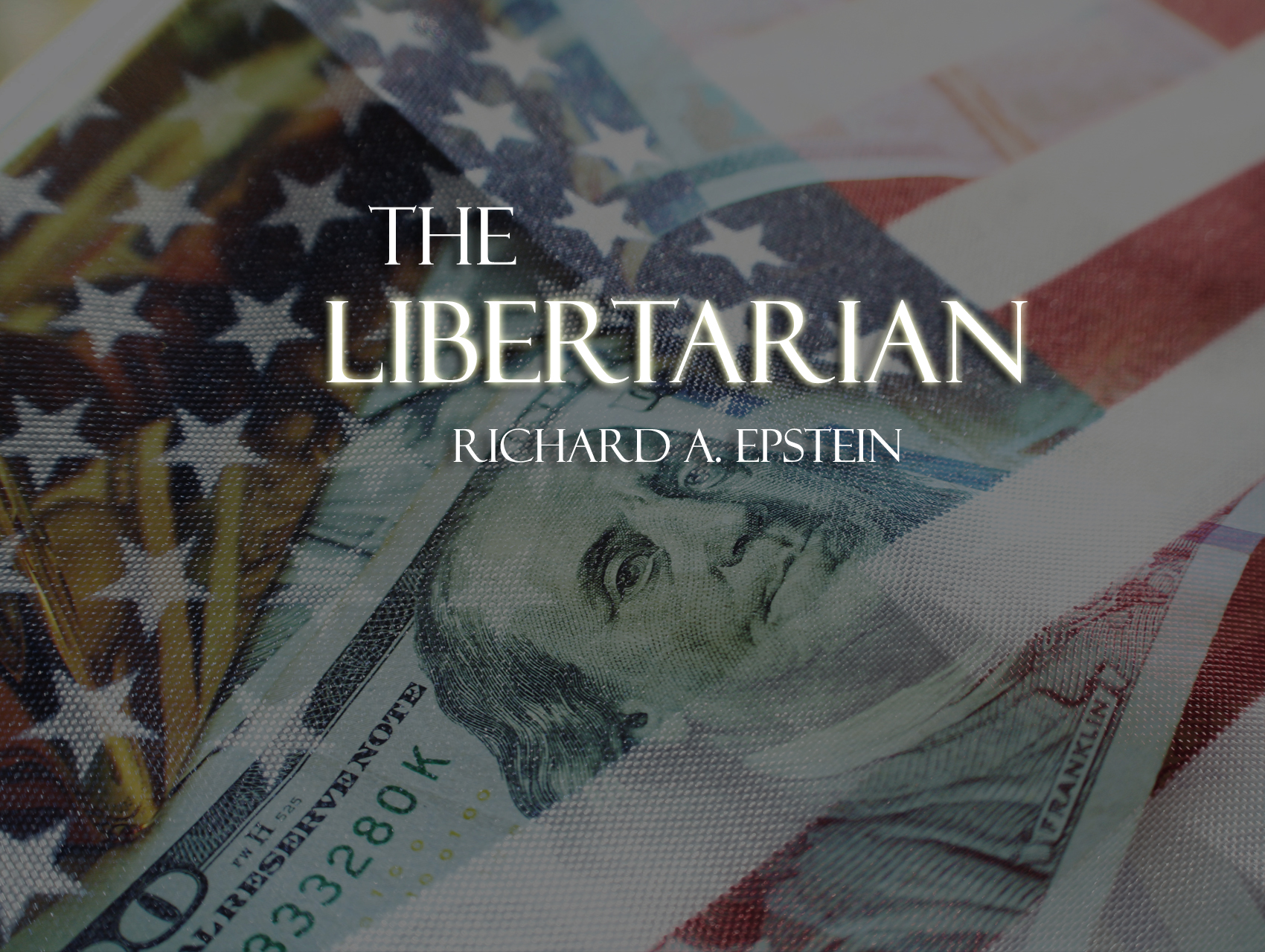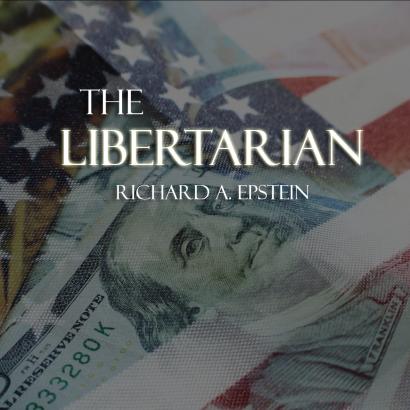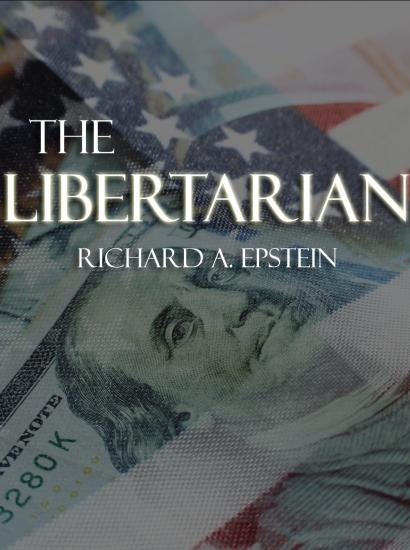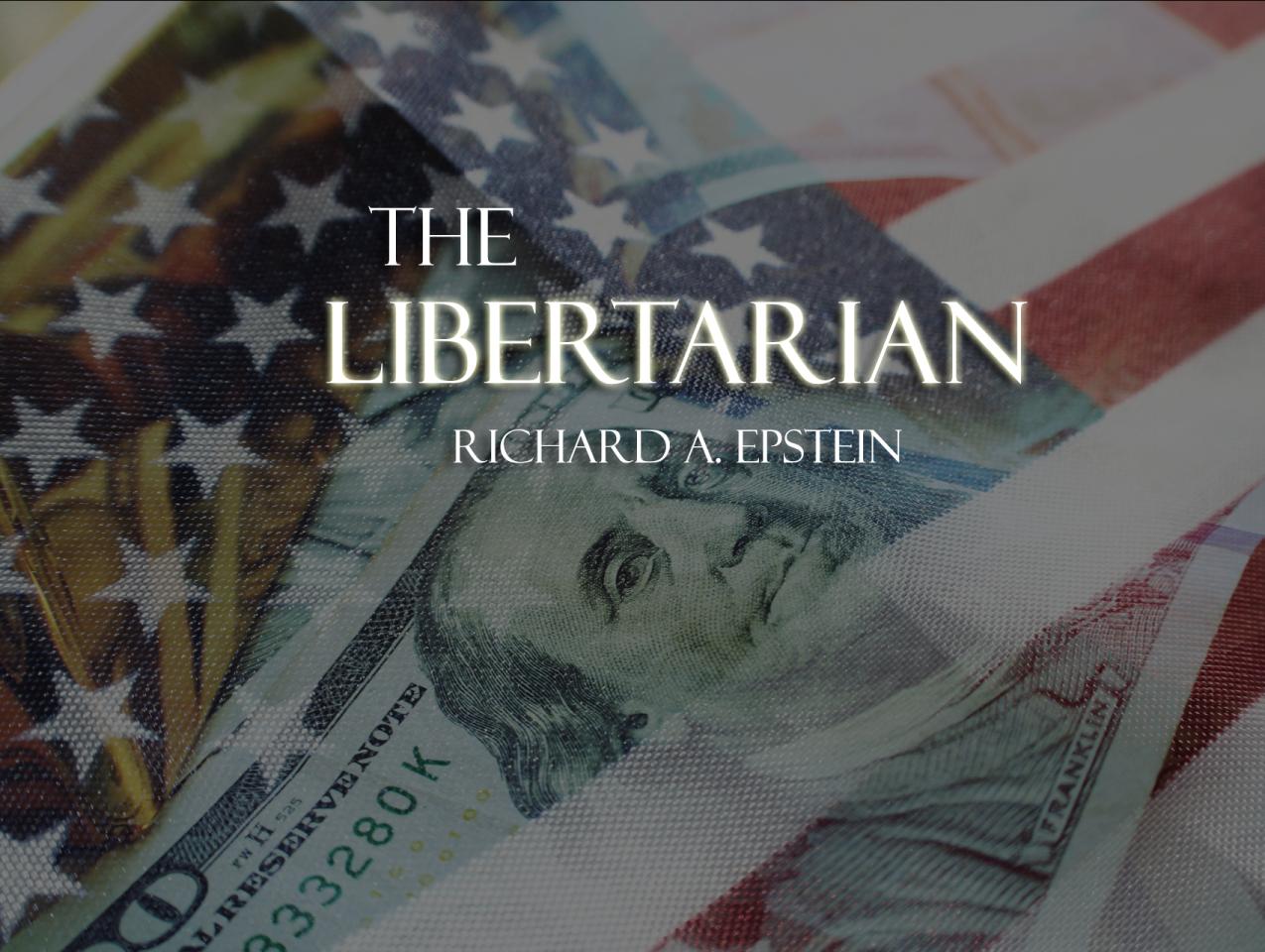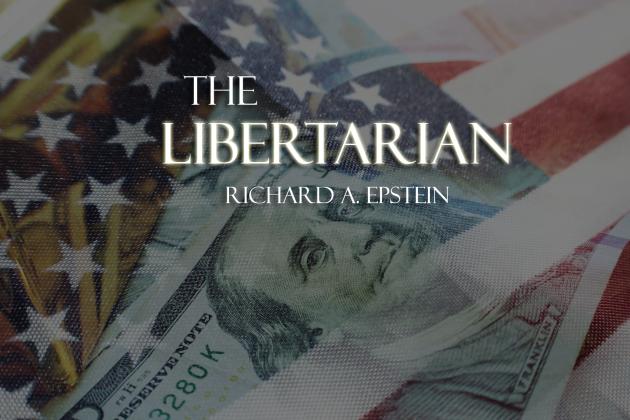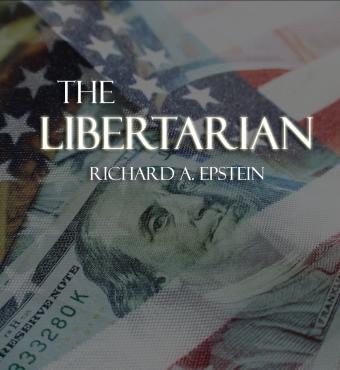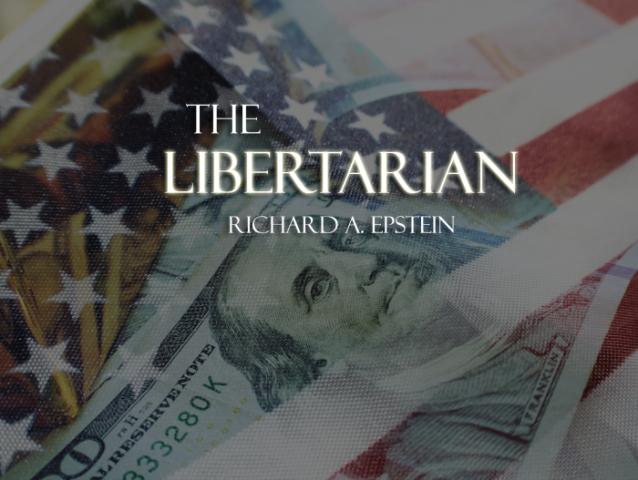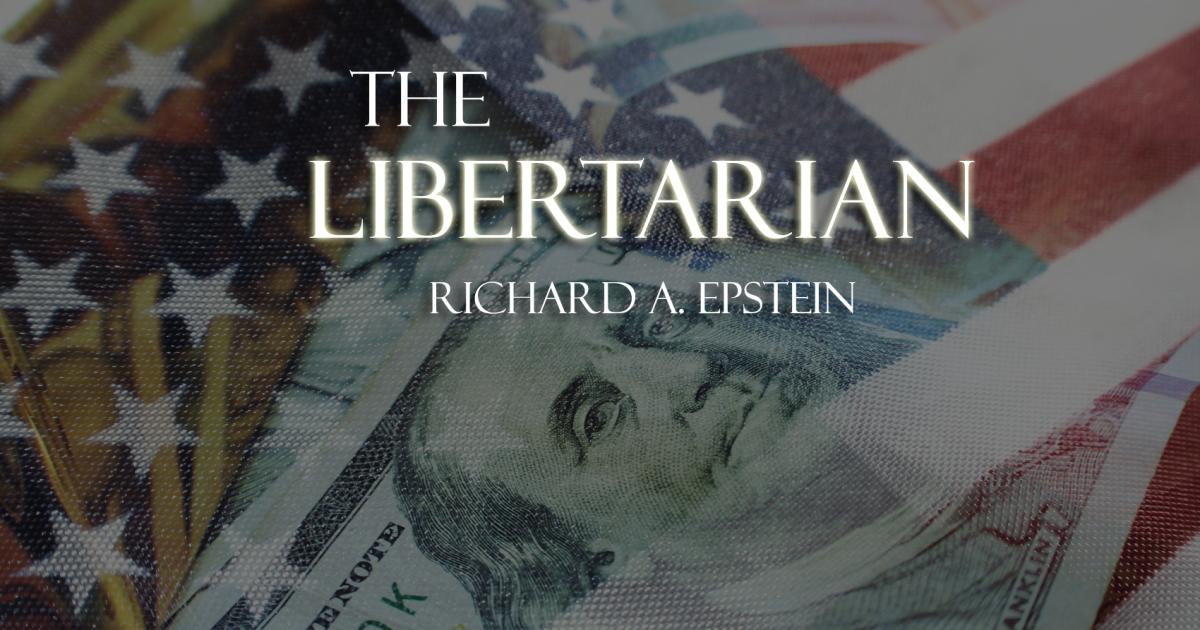Richard Epstein dissects the legal arguments in favor of ignoring the debt ceiling and pushes back on the notion that Congress nullified debt limits during federal budget arrangements in the 1970s.
>> Tom: This is the libertarian podcast from the Hoover Institution. I'm your host, Tom Church, and I'm joined as always, by the libertarian professor Richard Epstein. Here at Hoover, Richard is the Peter and Kirsten Bedford senior fellow. He's also the Lawrence A Tisch professor of law at NYU and is a senior lecturer at the University of Chicago.
And, Richard, we are about a week away from a hard debt default date, and I think even more people are suggesting that President Biden would have the authority to continue paying our bills even if that date passed. And I'm speaking specifically about a recent op ed in the Hill by Robert Hockett and Lawrence tribe, who argue that President Biden, quote, can and should ignore the Gopdhead and, quote, if it won't agree to his terms and then continue, and then he should continue paying our obligations.
And I know we talked about this a little bit before, but I really want to understand the 14th Amendment argument. You know, we chatted, and as we read the 14th Amendment, it makes sense to us that, you know, you can't. We're not going to pay, sorry this happened because we're not going to pay the Confederacy's debts, we're paying union's debts.
We're keeping them whole. But tribe and Hawk could argue that the 14th amendment even came about because when the conflict started up secessionists, those in the south had thought to destroy the union by making a default on its debt. And so therefore, part of the reason for the debt clause in the 14th amendment was to make sure that this couldn't happen.
Is that right? Can you talk to me how to understand this in a historical context?
>> Richard: This makes absolutely no sense to me. I mean, it was quite clear that if the Southeast decided to withdraw from the union, it would not be responsible for the debts of the unions, and it can incur its own debts.
And essentially, if you're going to secede from a union, you're not gonna worry about the fine points of the debt authorization under the existing constitution. What happens is the 14th amendment is passed in 1868, which is three years after the conflict is organized. And the challenge at that point was the reintegration of the southern states that had left into the union.
And whenever their major transition like this, there are always some very tough terms that are gonna be imposed. And one of the terms that were imposed was, look, all the debts that we incurred in order to make sure that insurrection and rebellion did not take place, and they did not mean it to our occupation of the capital, they meant a civil war.
Our obligations are good, but your obligations are not going to bind us. That's your own problem. You're a bunch of losers, and this is winners justice. So this is very much decided to do another way. The key words in the 14th amendment are as authorized by law. And what is clearly meant by that is there's a process by which debts are incurred in the name of the United States.
And this essentially is under article one, section eight, where it says that the United States government shall have the power to issue debt and it has to be authorized by Congress. And so essentially what happens, it gives the president no unilateral power. What this was about was creating a situation quite different from that in which it turns out that what you're doing is you're reaffirming your local debt, you're getting rid of the southern debt, you're not changing anything about the distribution of powers inside the union.
So this is completely miscast I think, as a historical argument shows a kind of a sign about desperation on the way in which these things ought to operate. So I think, in effect, that necessity breeds rather dubious history and that the more straightforward interpretation, one that Shri Prakash, for example, wrote about in the Wall Street Journal, is a much more accurate one.
And I never for once thought that this particular provision created a radical change. So I think if history is what we're going by, this thing is a dead loser.
>> Tom: All right, there's another argument they're making. Again, we're going to historical context for the debt limit, for congressional authorization and presidential authority, and they turn to the congressional budget and Impound Control act of 1974, a reaction to President Nixon perhaps not spending money that was appropriated.
And the claim that they're making is that since, and this is really something, but since Congress legislates specifically what the expenditures and what the taxes are, it, by implication, has granted authority to pay back federal debt issuances that cover the gaps between those expenditures and taxes. Thus in a sense, there is no debt limit, debt ceiling even necessary because, well, we've said, here's what we're gonna spend, here are the taxes we're gonna raise, ergo, we're going to issue some debt to pay the differences.
And then that debt has been authorized by Congress. That's all there is to it. What do you think?
>> Richard: Yeah, you can't even say that proposition with a straight face is what's going on. Look, I mean, what's going on in all of these particular cases is the abusive word by implication.
And what they're saying is when they pass an appropriation bill which has an indefinite obligation, what they've done is they've owed, undone the particular limitations that are contained in another statute. There's nothing at the time which indicated that the one was to overcome the other. If somebody had put this on the floor of the congress that, hey, by passing this particular bill, the debt limit is going to be eliminated, there would have been house of protests all across the line.
There's also a second mistake with respect to this argument, which I regard as just an elementary blunder. There are two congresses involved here. There's a democratic Congress which is quite profligate, willing to authorize all sorts of expenditures. Mind you, most of these are, shall we say, not liquidated programs, but you give us a particular program and we'll cover the cost.
And then they say since that Congress has done something, another Congress controlled by the other party is duty bound to respect all of its profligate decisions and to cave on that particular point. This is just not the case. What happens is the second Congress may have a duty, but the way in which it would probably exercise that duty would be to cut back on the expenditures in such a way so that the calamity does not take place.
This is a system of checks and balances. And checks and balances are good when it prevents stupid legislation, but in this particular case, it creates a showdown in which the president won't sign and the Democrats have enough blocking power so that the Republicans can't possibly override his veto.
But to think that anything done by the first Congress combine the second Congress is violently opposed to anything that's appropriate with respect to legal theory. There was a nice piece this morning in the Wall Street Journal in which they said there are ways in which you could finesse, but these are if you simply pay down certain kinds of obligations, say, on Social Security, it frees up money under the cop.
So you're not below, so you stay below the cap. And they also noted that this particular statute does not permit refinancing old debt with new debt to the extent that they're of the same amount. What it does is it prevents new appropriations from taking place. And so that gets you to the next question about what do we mean by June 1?
Well, there are two arguments. One is if these various devices are available, then it should be the case that you probably have a little bit more wiggle room. And then there's always the other argument. Remember, this is Biden's secretary of Treasury Janet Yellen making these statements. She said it could happen as early as June 1, but that's a very misleading way of putting it.
Does she really mean to say that it's certain to happen on that day, or should she give us a span of expected times, which may be and probably are ten days or two weeks later? And so it's an effort to try to put the gun with respect to the Republicans.
But then when you start talking about showdown poker and so forth, it's also putting the gun to the Democrat. And so each side could claim that the other is the spoiler in this situation. And McCarthy could say, look, we are trying to prevent the repetition of this problem.
We are not doing anything, which is positively crazy. And if you don't want to deal with us when there's a showdown, then it's you who are not acting in good faith, not us. And it turns out that that argument will have some traction if it turns out that this thing goes further, which is why it is that Biden, who's a weak president, not popular, certainly not able, is being forced to the table.
Because it turns out that he's going to have to face the thought that a single man who could have easily turned this thing around by making a couple of modest concessions here. There are the other players. Now, my own view as to how they ought to do this is I think they should take out of the budget negotiations anything that doesn't have to do with expenditures.
And so if they want to reform the way in welsh welfare benefits are given, don't do that in this negotiation. All you do is you stick to the budgetary kind of issues. That's a way of getting some of the Republican claims off the table and forcing the Democrats to focus on the claims that really matter.
So that's what I would do if I were running this strategy. But I have to tell you, Tom, nobody has yet hired me to take a conspicuous place in these negotiations.
>> Tom: Hey, let me run this scenario by you as well, because we're trying to figure out ways to find an agreement.
I think you and I both don't want some sort of default to happen. One thing they could do is make a temporary agreement, push it out to the end of the fiscal year, in which case they still won't have a budget. It would force the government shutdown and the amount of money saved by not paying federal employees and the rest of it might be enough to cover almost indefinitely the interest payments while they came to an agreement.
What do you think?
>> Richard: I think it's mad. Well, I mean, I have double emotions. I think many of the people who work for the federal government are not needed at all and should be just removed because their jobs are redundant. Or worse, if you look at any public agency and ask about the size of the staffing, it's probably three to four times of what you need.
If you were a private institution that was engaged in search for profit. So I kind of like the idea of eliminating employees, but shutting down the passport office. I mean, I don't really think that that's great. If you recall, Newt Gingrich had a confrontation with Clinton on that around 1994, and they did have these shutdowns and they were a bit too desperate.
And Clinton came out stronger from that thing than did Newton Minhum. So I think, in effect, that you don't want to do anything of that particular sort. You wanna basically, when you get to these things, do it straight. If you're gonna postpone it, just postpone it and say, I'll tell you what, we'll raise it such and such under the condition that you are absolutely going to sit down at this table and agree to some financial concession.
Two cent, that's not gonna do it. But the problem about this is that when you have these strong negotiations with bilateral position, the general principle that applies labor law is the best example of that. Is that each side is required to bother in good faith and neither side is required to make a concession.
Putting those two conditions together in connection with the National Labor Relations act has not been able to stop strikes. It's not been able to stop lockouts, it's not been able to do pretty much anything. But that's the only framework that we have to do this. And I think if the president says I'm not coming to the table, that's in bad faith.
But if he says I'm coming to the table and not making any concession, that may not be in bad faith. The national labor relations situation is a growth test failure. But there, there's a competitive alternative. When you have a system of checks and balances, you don't have a competitive market alternative.
So at that point, good faith is even more important than it is in the private context because strikes and lockouts are small beer compared to shutting down the entire government. What has happened in this particular case is McCarthy has outmaneuvered Biden. Everybody thought he was weak. They thought, just another dumb Republican political appointee.
But as far as I can tell, I think his approval ratings have gone up and I think he's proved himself relatively adroit in foreign affairs. Biden, for example, has completely manhandled the situation with respect to Netanyahu in Israel. And it turns out that McCarthy has done a very much better job on that particular situation.
So I think the Democrats have the really uneasy feeling that they may in fact, have the weaker bargaining condition. And it's also gonna be the case that many people say, if he does this, it may mean that McCarthy's chance of becoming president are down, but so would Biden's.
McCarthy's not a candidate, Biden is a candidate. And he now faces the very awkward proposition that he'll pump up Donald Trump to get him to be the nominee by essentially abusing him, prosecuting, building up his support in Republic ranks. And then he's building up the monster who could turn around and actually beat him.
So they actually have to worry about that particular scenario as well. I generally think that when it comes to things like this, the general pattern is that you get all the progress in the last five minutes of the negotiations, not in the first ten hours. And it may well be that we're gonna see that here.
And everybody knows about this particular pattern, which is why nobody, at least at this particular point, is essentially is panicking.
>> Tom: Let's get to the debt limit mechanism, I've kind of gone down the rabbit hole on this and trying to, again, figure out, good luck. I know I'm trying to figure out how these arguments work together with the 14th Amendment, but I go back to where the debt limit even came from.
I think it's rooted in, let's say, the Liberty Bond act of 1917. This notion of, here's the maximum you can get to. And I'm trying to figure out the interactions between that and these 14th Amendment claims. The 14th Amendment claims saying the president has the authority to make sure that the debt remains whole and honored.
However, Congress, by passing the Liberty Bond act, has said, here is the limit to which we can borrow. So how do those interact?
>> Richard: It's not that hard.
>> Tom: I know you don't buy that we can ignore it, but how do we.
>> Richard: They do interact in a perfectly sensible way.
The 14th Amendment essentially says that Congress has the power, when Congress has the power. It doesn't say that it is duty bound to impose a debt limit, but what cannot deny is that it's able to do that is one of the necessary and proper incidents of proper financial management.
So when they decide to put that thing into place in 1917, with the obvious concern about World War I lurking in the background of that situation, then that limitation is fine. So if Biden wants to come and says, look, I think debt limits are a bad thing, Paul Krugman is right.
Governments could always borrow cheap, and so therefore, they should borrow as much as they can until high water comes along, the Republicans could agree that and just take it off. But if they put it on it seems to me that's very much a part of the appropriations power and you can't wish it away.
So the history on this thing is perfectly clear as far as I'm concerned is that Congress gets to call the shots when it comes to the way in which we administer the debt. It calls a shot on how much we could borrow the terms and conditions it could set those as well but generally what happens is it sets a kind of an outer limit.
And then it delegates quite legitimately the powers on the details of the bond offering to the treasury office with this particular kind of expertise. So this is a perfectly standard distribution of powers, delegated powers between the basic Congress and what happens in the executive branch. And what Biden wants to do is to blow this particular arrangement up and I know he can't win.
And so what the financial markets are gonna tell you we heard Richard Epstein well they've heard somebody at least saying this may be iffy nobody is going to. To buy anything from the United States if they think that it can be repudiated because it was not properly authorized.
And this is not only a risk, I think it's a dead certainty. And I don't think this is 6-3 in the Supreme Court, I think it's 9-nothing. Remember, we have had some 9-nothing decisions lately.
>> Tom: Yeah.
>> Richard: And I think that this particular case, Biden is swimming against the tide.
Also, it's clear in the United States there's a massive uneasiness about inflation, increase in the size of government. And what happens is this will be seen as many people as part of the progressive initiative to take over all the branches of government, put them into the executive power.
And they will treat his usurpation of the debt limit like his abuse of the executive order, like the terrible kinds of things that take place through administrative agencies which are now under attack. Essentially what's going on in the United States is a very big fight between those who believe in limited governments.
And those who do not, and those who do not include Joe Biden, who could never quite explain why he believes what he believes. But nonetheless, he's on that particular course. And I think, in fact, he's going to, if he gets his way on the debt limit, he's going to lose politically.
So I think he's in a very hard pace. There's a real advantage that McCarthy has. He's not running for public office.
>> Tom: Last one for you, Richard, and I'll make it an easy one.
>> Richard: Good.
>> Tom: Do you think we're going to get some sort of agreement?
>> Richard: Yes.
>> Tom: You know what?
>> Richard: In general-
>> Richard: My view is it's the way it usually happened, but I would say, the odds are 70-30. I mean, I'm not inside these negotiations. What you could do is you sit down and you play the game. Here I am, and you imagine yourself to be in both roles, and you ask yourself what you're saying to your aides and how it is you're going to come out.
And when I do that, I think there are more weaknesses on the Biden side, the hard line, than there are on the McCarthy side because he has some flex in his position, as stated. He's already announced that he has some flex. I've given some indications as to the kinda things that might be taken out of this and keeping it into a straight debt then.
And Financial Management Bill, Biden has nothing whatsoever to say because he won't promise anything. Let me just ask on one point, what is Biden's view of debt reduction? He says, well, first of all, you increase expenditures by $100 billion on whatever program we wanna put into play. And then we increase taxes by $110 billion, so I've engaged in debt reduction of $10 billion.
But that's not what he's doing, of course. The expenditures are for certain, and the tax revenues are very uneasy. And if he keeps this thing going, he'll fall short of his particular projection. So if he wins, there's gonna be a complete catastrophe with respect to budget negotiations, as he continues to say that debt reduction requires government expansion.
And that's all intellectual double-talk. What he really needs to do is to say which of these programs can we do without, since many of them have only been put into place in the last ten years and decide which his priorities are. That's what budgets are about, set priorities amongst alternative program.
That's not what he's doing in this particular case.
>> Tom: You've been listening to the libertarian podcast with Richard Epstein. As always, you can learn more if you head over to Richard's column, The Libertarian, which we publish on hoover.org at Defining Ideas. If you found this conversation thought-provoking, please share it with your friends and rate the show on Apple Podcasts or wherever you're tuning in.
For Richard Epstein, I'm Tom Church, we'll talk to you next time.
>> Speaker 8: This podcast is a production of the Hoover Institution, where we advance ideas that define a free society and improve the human condition. For more information about our work, or to listen to more of our podcast or watch our videos, please visit hoover.org.







